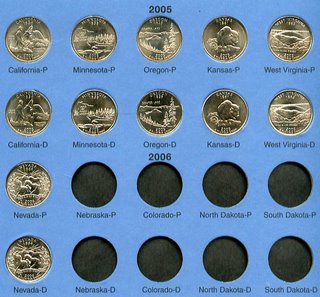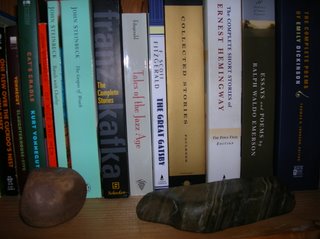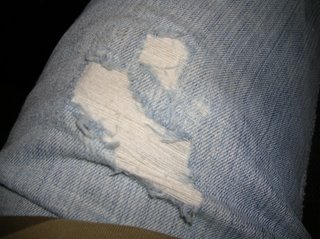Generic America
 Today as I reflected over the vast amount of changes that are about to take place in my life, for the first time I got The Fear with a completely sober head. It was a sort of momentary wave of panic that the fun might be over.
Today as I reflected over the vast amount of changes that are about to take place in my life, for the first time I got The Fear with a completely sober head. It was a sort of momentary wave of panic that the fun might be over.See, this is my last semester, as I graduate in May. I don’t plan to make any kind of final walk or get all teary-eyed to “Pomp and Circumstance” as I anticipate throwing my square academic hat into the air only to lose it and pick up someone else’s. I intend to have my degree quietly mailed to my house so my parents can hang it up on the wall and admire it with some satisfaction that I actually graduated.
When I consider my college experience, I can’t help but feel slightly disappointed that it’s finally over. Sure, I am trying like hell to get into graduate school, but I am sure that will prove to be much harder and especially tedious since I won’t be living on campus anymore.
That’s right; I am getting a house off campus. My roommate, his girlfriend, my neighbor and I already paid our $750 deposit for a three-bedroom, two-bathroom house about three miles from campus. It has about an acre’s worth of yard and trees complete with plenty of Kentucky farmland nothingness to stand on the porch and stare out into during cigarette breaks.
I have never paid monthly rent before, so I am looking forward to learning something. In a way, I will be glad to get away from campus and retire each night into the peace and quiet of the Richmond countryside. I will have a yard to mow, a hammock, and hopefully a garden though it is too late to plant some things. Also, there are no streetlights, so I can dust off my telescope and actually get a good view of the Milky Way again.
One thing I look forward to is further isolation from Generic America. By that I mean all the people who just walk around everyday concerned only with their own lives and what seems to be the trendiest thing to do at the moment. Those people who are only concerned about the Now. When I was in high school, I used to dream about how college would be far less generic. I imagined a place where thought and discussion would dominate, where fashion wouldn’t exist, where people actually went to the library to read and where students actually participated during class discussion with interest.
I soon discovered that college is mostly just an extension of high school, but worse. It’s actually a conformity factory. I would say 90 percent of college students go to college because they either are forced/expected to by their parents or they just want to get away from home. They don’t give a shit about actually doing something productive with their lives. They join fraternities and sororities and they all have the same generic haircuts and wear identical generic shirts. Sometimes I wonder how they even recognize each other.
When the classes are actually full, it’s usually because there is an exam that half the people will fail because they’ve only been to class two other times. Also like high school, they still compete to see who can play the loudest, most incomprehensible music that can rattle itself out of the trunk. Judging by the police reports I read in the paper every week, this place seems to be a breeding ground for racism, sexism, bigotry, alcoholism and crime—things that an academic institution is supposed to discourage.
It’s probably not as dramatically tragic as I make it out to be. I just thought college would be a little different. I thought people would be encouraged to be individuals. Most have good intentions, but it’s very disheartening to see people silently “play the game” and act as if they have absolutely no sense.
I’ve recently become acquainted with an international student from Holland. I am always happy to talk to Europeans because they seem to have such a stronger grasp of reality than most Americans do. One night I asked him what he imagined America to be like before he came here, and what he thinks about it now after living here for four months. He said that most people in Holland think America is the most violent and crazy place on the planet. He truly considered the possibility that he might never make it home alive after coming to study here.
He thinks otherwise now of course, but I wonder how America got such a reputation? Are we really so violent and spontaneously insane? I don’t think we are, but I think we have grown increasingly ignorant over the years. Ignorant does not means “stupid” it just means “not informed.” The vast majority of us only speak one language. We think stem-cell research kills babies. We think women should not be allowed to have an abortion if they want to. We watch FOX news. We think oil is the end-all, ONLY option for energy. We think Mexico is invading us. We think Canada is stupid. We think guns are bad. We think global warming doesn’t exist. Marijuana is still illegal. We think pills will solve all our stress and insomnia problems. We don’t care what goes on in the rest of the world unless it serves our short-term interests and finally, we elected a president who sent this country into a war that none of us wanted. What's worse, we elected him twice.
I don’t know about you, but I consider myself very patriotic. It really bothers me that America has such a terrible reputation with the rest of the world. America has had its good times and bad times, when people were enlightened or paranoid. There’s no doubt in my mind that we will be seen as an admirable, “city on the hill” again, I just hope that it’s soon. We have the resources, the money, and the potential to be great again. We're just directing it in the wrong places and need to refocus our "efforts" if you want to call them that.
In the meantime, in a few weeks I will be living out in the country away from generic people until that happens.






